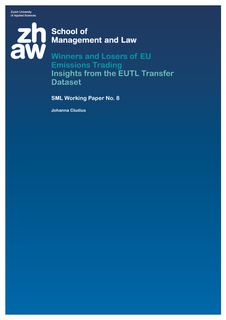Bitte benutzen Sie diese Kennung, um auf die Ressource zu verweisen:
https://doi.org/10.21256/zhaw-1042| Publikationstyp: | Working Paper – Gutachten – Studie |
| Titel: | Winners and losers of EU emissions trading : insights from the EUTL transfer dataset |
| Autor/-in: | Cludius, Johanna |
| DOI: | 10.21256/zhaw-1042 |
| Erscheinungsdatum: | Jan-2016 |
| Reihe: | SML Working Paper |
| Reihenzählung: | 8 |
| Verlag / Hrsg. Institution: | ZHAW Zürcher Hochschule für Angewandte Wissenschaften |
| Verlag / Hrsg. Institution: | Winterthur |
| Sprache: | Deutsch |
| Schlagwörter: | Emissions trading scheme; EU ETS; EUTL transfer data; Distributional effects; Free allocation; Two-step selection model |
| Fachgebiet (DDC): | 333: Bodenwirtschaft und Ressourcen 338.927: Umweltökonomie und nachhaltige Entwicklung 363: Umwelt- und Sicherheitsprobleme |
| Zusammenfassung: | This paper analyzes distributional effects the EU Emissions Trading Scheme (EU ETS) created between participants of the scheme during its first trading period. To this end, a dataset recording all transfers during the first period of the EU ETS, originally at account level, was enhanced by adding information about parent companies, firm characteristics, and carbon prices. A two-step selection model was formulated and applied to the data. To account for a number of uncertainties, sensitivity analysis with regard to forward and futures trading was carried out. Findings confirm that free allocation in excess of actual emissions (‹overallocation›) is a major source of gain generated under the Scheme. The fact that small companies are much less likely to participate in trading is a further cause of distributional effects. This paper also discusses that windfall profits obtained by passing through the cost of freely allocated allowances to consumers are likely to dwarf the gains and losses made on the market for EU Allowances. It is therefore quite likely that the majority of companies covered by the EU ETS generated gains during its first period, either through selling overallocation on the market or by generating windfall profits on product markets. Therefore, decisions about the level of free allocation not only have distributional implications for the participants of an emissions trading scheme but determine the distribution of costs and benefits between covered companies and households. |
| URI: | https://digitalcollection.zhaw.ch/handle/11475/1042 |
| Departement: | School of Management and Law |
| Organisationseinheit: | Institut für Regulierung und Wettbewerb (IRW) |
| Enthalten in den Sammlungen: | Energierecht & Energy Policy Analysis |
Dateien zu dieser Ressource:
| Datei | Beschreibung | Größe | Format | |
|---|---|---|---|---|
| 2016_Jan_Cludius_EU_ETS_winners_losers (A).pdf | 702.6 kB | Adobe PDF |  Öffnen/Anzeigen |
Zur Langanzeige
Cludius, J. (2016). Winners and losers of EU emissions trading : insights from the EUTL transfer dataset. ZHAW Zürcher Hochschule für Angewandte Wissenschaften. https://doi.org/10.21256/zhaw-1042
Cludius, J. (2016) Winners and losers of EU emissions trading : insights from the EUTL transfer dataset. Winterthur: ZHAW Zürcher Hochschule für Angewandte Wissenschaften. Available at: https://doi.org/10.21256/zhaw-1042.
J. Cludius, “Winners and losers of EU emissions trading : insights from the EUTL transfer dataset,” ZHAW Zürcher Hochschule für Angewandte Wissenschaften, Winterthur, Jan. 2016. doi: 10.21256/zhaw-1042.
CLUDIUS, Johanna, 2016. Winners and losers of EU emissions trading : insights from the EUTL transfer dataset. Winterthur: ZHAW Zürcher Hochschule für Angewandte Wissenschaften
Cludius, Johanna. 2016. “Winners and losers of EU emissions trading : insights from the EUTL transfer dataset.” Winterthur: ZHAW Zürcher Hochschule für Angewandte Wissenschaften. https://doi.org/10.21256/zhaw-1042.
Cludius, Johanna. Winners and losers of EU emissions trading : insights from the EUTL transfer dataset. ZHAW Zürcher Hochschule für Angewandte Wissenschaften, Jan. 2016, https://doi.org/10.21256/zhaw-1042.
Alle Ressourcen in diesem Repository sind urheberrechtlich geschützt, soweit nicht anderweitig angezeigt.